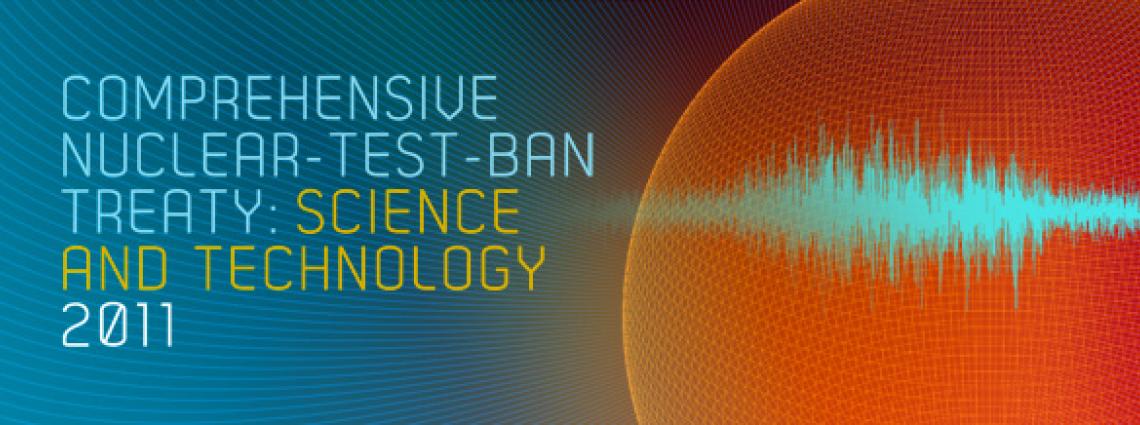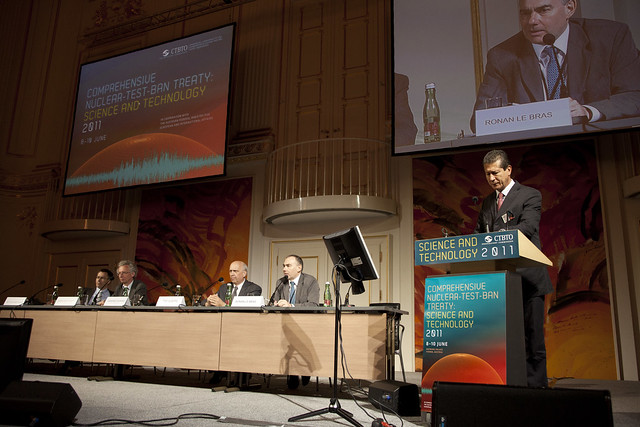Science and Technology Conference, 2011
To build and strengthen its relationship with the broader science community in support of the Treaty, the CTBTO invited the community to a scientific conference CTBT: Science and Technology 2011 (S&T2011), which was held from 8 to10 June 2011 at the Hofburg Palace in Vienna, Austria.
This multidisciplinary scientific conference, designed to foster partnerships on many levels, attracted working scientists and technologists, science administrators, scientific representatives to the CTBTO's policy-making organs, and representatives of agencies that fund research and development in areas potentially relevant to the Treaty's verification system.
Conference Goals
The three major goals of the conference were to:
- Discuss advances in science and technology relevant to test ban verification.
- Explore scientific applications of the CTBT verification infrastructure.
- Encourage partnerships and knowledge exchange between the CTBTO and the broader scientific community.
Conference Themes
- The Earth as a complex system
- Understanding the nuclear explosion source
- Advances in sensors, networks and observational technologies
- Advances in computing, processing and visualization for verification applications
- Creating knowledge through partnerships, training and information / communication technology
Conference Schedule
| Grosser Saal |
CTBT: Science and Technology 2011 |
|---|---|
| OPENING Day: morning session | |
| 10:00 AM - 2:00 PM |
Message from the United Nations Secretary-General: HE Mr Ban Ki-moon Opening remarks by HE Mr Tibor Tóth, Executive Secretary of the Preparatory Commission for the Comprehensive Nuclear-Test- Ban Treaty Organization |
| OPENING Day: afternoon session | |
| 2:00 PM - 4:00 PM | T1-O2. Rupture dynamics of large earthquakes inferred from hydroacoustic data Catherine de Groot-Hedlin T1-O9. Next-level shake zoning for modeling seismicwave propagation in the U.S. Intermountain West John N. Louie T1-O10. Ground motion studies for critical sites in north-east Bangladesh Tahmeed Malik Al-Hussaini, M.Nayeem Al-Noman T1-O11. Prediction of aftershocks distribution using artificial neural networks Mostafa AllamehZadeh T1-O13. Seismicity and seismic hazard assessment of the arid western regions of South Africa Hlompho Malephane T1-O14. Crustal thickness and average VP/VS ratio variations in northern Viet Nam from teleseismic receiver function analysis Van Duong Nguyen, Bor-Shouh Huang, Tu-Son Le, Van-Toan Dinh Coffee break |
| OPENING Day: afternoon session cont. | |
| 4:00 PM - 7:00 PM | T1-O15. Scattering and intrinsic attenuation structure in Central Anatolia, Turkey using BRTR (PS-43) array data Korhan Umut Semin, Nurcan Meral Ozel T1-O16. Detection of earthquake hazard in southwest peninsular India – Spurt of various unusual geological incidents D. Shanker, H. N. Singh, John Matha, V. N. Neelakandan, A. Kumar T1-O17. Upper crust structure under CTBTO station “Petropavlovsk-Kamchatsky” by endogenic microseismic activity Yulia Kugaenko, Vadim Saltykov, Victor Chebrov T4-O1. Distributed e-infrastructures for data intensive science Robert Jones T4-O8. Anomalous infrasound propagation through the dynamic stratosphere Läslo Evers, Anton Van Geyt, Pieter Smets, Julius Fricke T4-O12. Analysis of classification possibility infrasound signals from different sources based on correlation ability Sergey Kulichkov, Alexei Chulichkov, Nadezhda Tsybulskaya T4-O10. A statistical framework for operational infrasound monitoring Stephen Arrowsmith, Rod Whitaker Break |
| Kleiner Saal |
CTBT: Science and Technology 2011 |
|---|---|
| OPENING Day: afternoon session | |
| 2:00 PM - 4:00 PM | Theme 2 Introductory Remarks Mr Oleg Rozhkov Director, On-Site Inspection Division, CTBTO T2-O1. Understanding the radionuclide source term for underground nuclear explosions Harry Miley T2-O2. The global atmospheric noble gas background Anders Ringbom T2-O12. Medical isotopes studies Judah Friese, Rosara Payne T2-O10. Temporal evolution of the radioxenon signature from underground nuclear explosions Martin Kalinowski |
| 4:00 PM - 7:00 PM | T2-O6. Analysis of fission products in air samples due to nuclear explosion source Abdus Sattar Mollah T2-O9. Effects of non-isotropic explosion sources upon the utility of the Ms-mb discriminant Paul G. Richards T2-O4. Numerical experiments on explosions triggering earthquakes Luis Angel Dalguer, Florian Haslinger, Seok Goo Song, Tarje Nissen-Meyer, Domenico Giardini T2-O7. Modelling of elastic waves generated by a point explosion Zurab Kereselidze, Nino Tsereeli T2-O11. Seismo-acoustic energy partitioning from shallow and surface explosions Jessie Bonner et al. T2-O8. The source time function of an explosive source Anton Ziolkowski T2-O3. New and novel technologies for CTBT radionuclide measurement and analysis Harri Toivonen T2-O13. The IAEA Department of Safeguards: Crossover novel technologies Andrew Monteith, Julian Whichello |
Abstracts
Click on the themes to view the corresponding abstracts (both oral presentations and poster submissions):
- The Earth as a complex system
- Understanding the nuclear explosion source
- Advances in sensors, networks and observational technologies
- Advances in computing, processing and visualization for verification applications
- Creating knowledge through partnerships, training and information / communication technology
- Session On The 11 March 2011 Japanese Event And Its Aftermath
Publications and Documents
- Scientific Advances in CTBT Monitoring and Verification Review of Presentations and Outcomes of the 2011 SnT Conference
- Book of Abstracts (includes abstracts for oral presentations and poster submissions)
- Four page PDF brochure providing important information on the conference "CTBT: Science and Technology 2011", presenting the conference themes and introducing the Programme Committee
- Overview of Oral Presentations


